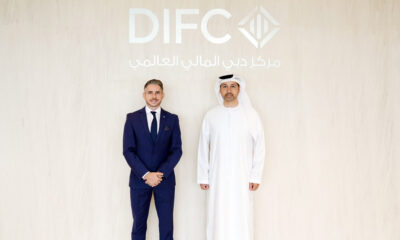News
Binance Is Helping Dubai Become The World’s Crypto Capital
The goal is to create a special crypto zone and provide assistance to crypto-related businesses that are interested in becoming licensed in Dubai.

Binance, the largest cryptocurrency exchange in the world, has recently signed a deal with the Dubai World Trade Centre Authority (DWTCA) to create an ecosystem for cryptocurrencies and other global virtual assets.
“With the MoU, Binance will help advance Dubai’s commitment to establishing a new international Virtual Asset ecosystem that will generate long-term economic growth through digital innovation” said the Binance team in a statement. “Binance believes that Dubai’s new agenda will contribute to the growth of the global economy”.
To achieve this goal, Binance and DWTCA want to create a special crypto zone and provide assistance to crypto exchanges, businesses that offer blockchain, and Distributed Ledger Technology (DLT) services that are interested in becoming licensed in Dubai.
Because Dubai doesn’t want to associate itself with illegal activity, DWTCA will additionally act as a regulator and enforce investor protection standards, as well as anti-money laundering (AML) and Combating the Financing of Terrorism (CFT) laws.
At this point, we don’t know when the crypto zone will become operational. Binance and DWTCA have so far only signed a Memorandum of Understanding (MoU) that outlines their shared vision, but many technical and regulatory details have certainly yet to be worked out.
Also Read: 5 Gaming Cryptos That Will Explode In 2023
The project could be affected by the large regulatory pressure Binance is currently facing from regulators around the world.
For example, the Dutch central bank accused it of not complying with AML and CFT laws, the US Justice Department and Internal Revenue Service is probing the exchange to investigate money laundering and tax offenses, the UK’s Financial Conduct Authority has banned the Binance Group from operating in the UK, and the Securities and Futures Commission (SFC) has issued a warning to consumers, stressing that the company isn’t licensed to conduct regulated activity in Hong Kong.
It’s possible that Binance, which describes itself as a decentralized company with a global presence and whose corporate structure is opaque at best, is interested in establishing the crypto zone in Dubai to create a safe haven for itself.
News
Rabbit Expands Hyperlocal Delivery Service In Saudi Arabia
The e-commerce startup is aiming to tap into the Kingdom’s underdeveloped e-grocery sector with a tech-first, locally rooted strategy.

Rabbit, an Egyptian-born hyperlocal e-commerce startup, is expanding into the Saudi Arabian market, setting its sights on delivering 20 million items across major cities by 2026.
The company, founded in 2021, is already operational in the Kingdom, with its regional headquarters now open in Riyadh and an established network of strategically located fulfillment centers — commonly known as “dark stores” — across the capital.
The timing is strategic: Saudi Arabia’s online grocery transactions currently sit at 1.3%, notably behind the UAE (5.3%) and the United States (4.8%). With the Kingdom’s food and grocery market estimated at $60 billion, even a modest increase in online adoption could create a multi-billion-dollar opportunity.
Rabbit also sees a clear alignment between its business goals and Saudi Arabia’s Vision 2030, which aims to boost retail sector innovation, support small and medium-sized enterprises, attract foreign investment, and develop a robust digital economy.
The company’s e-commerce model is based on speed and efficiency. Delivery of anything from groceries and snacks to cosmetics and household staples is promised in 20 minutes or less, facilitated by a tightly optimized logistics system — a crucial component in a sector where profit margins and delivery expectations are razor-thin.
Despite the challenges, Rabbit has already found its stride in Egypt. In just over three years, the app has been used by 1.4 million customers to deliver more than 40 million items. Revenue has surged, growing more than eightfold in the past two years alone.
Also Read: Top E-Commerce Websites In The Middle East In 2025
CEO and Co-Founder Ahmad Yousry commented: “We are delighted to announce Rabbit’s expansion into the Kingdom. We pride ourselves on being a hyperlocal company, bringing our bleeding-edge tech and experience to transform the grocery shopping experience for Saudi households, and delivering the best products – especially local favorites, in just 20 minutes”.
The company’s growth strategy avoids the pitfalls of over-reliance on aggressive discounting. Instead, Rabbit leans on operational efficiency, customer retention, and smart scaling. The approach is paying off, having already attracted major investment from the likes of Lorax Capital Partners, Global Ventures, Raed Ventures, and Beltone Venture Capital, alongside earlier investors such as Global Founders Capital, Goodwater Capital, and Hub71.


























